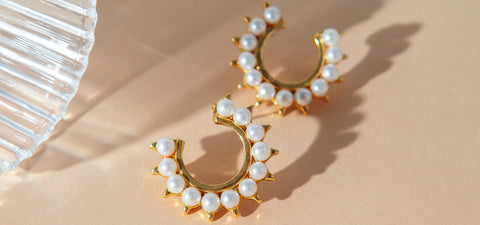-
6mm Curb Chain Anklet
Regular price Dhs. 65.00 AEDRegular priceUnit price per -
3 Layers Necklace
Regular price Dhs. 120.00 AEDRegular priceUnit price per -
Double Square Pearl
Regular price Dhs. 60.00 AEDRegular priceUnit price per
Best Collection of Hypoallergenic Accessories In Dubai
Hypoallergenic accessories and jewellery add strength, durability, and tarnish resistance to your outfit while also making you feel amazing. By purchasing high-quality jewellery, you can avoid future issues with sensitive skin, such as rashes and itching earlobes.
Our dedication to quality at Kalopsia goes beyond design; we recognise the value of appropriate upkeep and care to maintain the integrity and beauty of your prized possessions.
What is Hypoallergenic Jewelry and Why are they Important?
Metals used to make hypoallergenic accessories are less likely to trigger allergic reactions. Allergies to several metals exist, but the most prevalent type is nickel allergy. An alloy is a combination of metals that is used in jewellery to give it more strength. Silver and gold, which are softer metals, are frequently strengthened with the addition of nickel. However, 15% of people have an adverse skin reaction to nickel. If a piece of jewellery has either no nickel or too little nickel to produce a skin reaction, it is typically regarded as hypoallergenic.
Now that you know what hypoallergenic earrings are, here are reasons why you might want to purchase hypoallergenic earrings, even if you don’t have a nickel allergy:
- Minimal risk of allergic reaction
- Better for sensitive lobes
- High-quality craftsmanship
- Last longer
Care and Maintenance Tips
Proper care and maintenance are essential to preserve the beauty and integrity of your hypoallergenic jewelry. Follow these guidelines to ensure your pieces remain pristine:
- Gentle Cleaning: Regularly clean your hypoallergenic accessories using mild soap and warm water. Gently scrub with a soft-bristled brush to remove any dirt or residue. Avoid harsh chemicals or abrasive cleaners, as they may damage delicate materials.
- Avoid Moisture: Remove jewelry before swimming, showering, or engaging in water-related activities to prevent moisture buildup, which can tarnish metals and compromise their hypoallergenic properties.
- Store Properly: When not in use, store your hypoallergenic accessories in a dry, cool place, away from direct sunlight and moisture. Consider storing each piece separately to prevent tangling or scratching.
- Avoid Harsh Chemicals: Avoid exposing your hypoallergenic jewelry to harsh chemicals such as perfumes, hairsprays, or cosmetics, as they may react with the metal and cause discoloration or damage.
Choose the Right Hypoallergenic Jewelry
Make sure the jewellery is nickel-free when selecting hypoallergenic options. When buying online, search for terms such as "hypoallergenic" or "nickel-free." Get in touch with the us if you have questions.
One of the most crucial pieces of advice when looking for hypoallergenic jewellery is to stay away from costume jewellery at all costs, since it usually consists of a combination of inexpensive and irritating materials.
Last but not least, if you have questions concerning a particular piece of jewelry's hypoallergenic qualities, seek the advice of a dermatologist or allergist who can best assess your needs. Buy your hypoallergenic accessories from trusted brands like Kalopsia who are able to confirm the alloys and purity of each metal.
FAQ
What jewelry is hypoallergenic?
Silver, rhodium, palladium, and platinum are a few of the most widely used hypoallergenic metals in jewellery. Every metal has special qualities and advantages, so while choosing a piece, it's necessary to take your needs into account.
Is hypoallergenic jewelry safe?
Yes, those with sensitive skin or metal allergies can safely wear hypoallergenic accessories. But it's crucial to make sure the components are actually hypoallergenic and devoid of frequent allergies like nickel.
What metal is most hypoallergenic?
Due to its high biocompatibility and low tendency to trigger allergic reactions, even in people with severe metal sensitivity, titanium is frequently regarded as one of the most hypoallergenic metals.
Is hypoallergenic jewelry good for sensitive skin?
Yes, since hypoallergenic accessories lowers the possibility of allergic responses that are frequently linked to non-hypoallergenic materials, it is a great choice for people with sensitive skin.
What metal is 100% hypoallergenic?
As titanium is inert and biocompatible, it is frequently thought to be the metal that is most generally hypoallergenic, while no metal can be guaranteed to be 100% hypoallergenic for everyone.
Is stainless steel hypoallergenic?
As nickel is a frequent allergen and stainless steel contains little to no nickel, it is largely hypoallergenic for most people. Some people with severe nickel allergies, however, may still experience adverse reactions from specific stainless steel grades.
Is Rose gold hypoallergenic?
Even rose gold, a combination of copper and gold, may still have minute amounts of other metals, including nickel, which some people may be allergic to. While it's not always hypoallergenic, it's typically thought to be safer for skin that is sensitive than alloys containing nickel.
Is real gold hypoallergenic?
As pure gold (24 carats) is a soft metal without any alloys that frequently trigger allergy reactions, it is typically hypoallergenic. To reduce the possibility of allergic responses, the karat purity should be taken into account, as the majority of gold jewellery is alloyed with other metals for durability.
Are earrings hypoallergenic?
If earrings are composed of hypoallergenic materials like titanium, surgical stainless steel, or nickel-free gold, then they can be considered hypoallergenic. Selecting earrings composed of materials that are less prone to trigger allergic responses is crucial, particularly for those with delicate earlobes.







